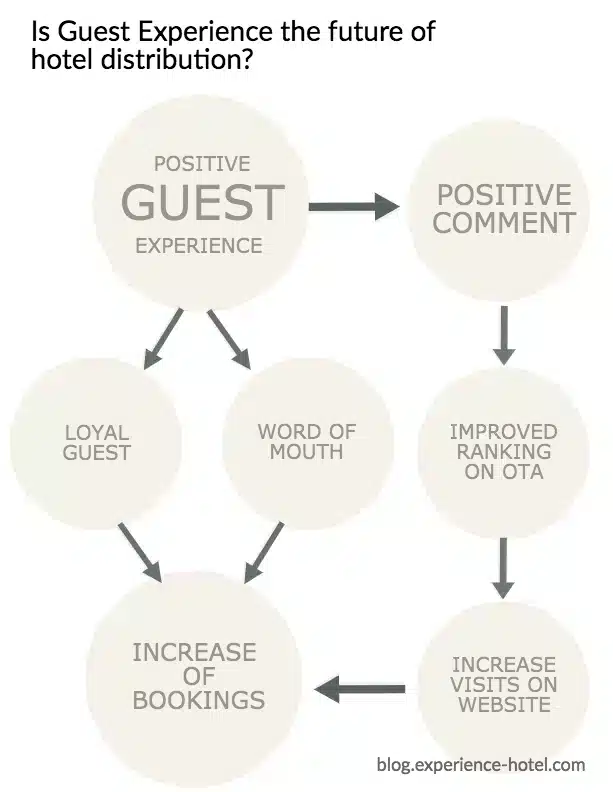Is the guest experience the future of hotel distribution?
Martin Soler, a friend and close collaborator, recently told me about an article which had generated quite a storm and lead to some polemical discussion in the hotel world.
In the article, David Turnbull (co-founder of the SnapShot company) states:
“If I was starting a hotel from scratch, I’d give all my distribution to OTAs and just concentrate on the guest and their experience.”
Is this blasphemy or a visionary outlook? There are many who believe that David is blaspheming. But I don’t fully agree with their opinion. Taking his conclusion as a starting point, I carried out my own analysis to fully examine the impact of the guest experience on your hotel’s distribution. And these are the results.
Happy reading!
SEO 15 years ago
Natural referencing (also called SEO, which stands for Search Engine Optimisation) has long been a powerful lever for independent hoteliers. When I began my career as a marketer in the independent hotel sector in 2001, the company I was working for was selling great swathes of natural referencing to hoteliers. And the results were clear!
Those with hotels on the first page of the Google search results for key words like “3-star hotel in Paris” “Charming Hotel Cannes” or “Luxury Hotel in Burgundy” found it made a huge difference to booking rates.
I can still remember a hotel we had referenced with the phrase “Paris Hotel France”. It was booked up almost solely by internet users finding it on the first page of their Google search results.
How did things then evolve?
Progressively things evolved and the magic gradually wore off. Firstly, Google AdWords launched in 2005. This system meant OTAs could compete overnight with hotels by paying to be displayed at the top of search results.
Then, over time, OTAs and review sites grew to feature incredible amounts of content. They then ousted the poor independent hoteliers who had invested in natural referencing for many years. And that was the end of SEO for independent hotels!
And yet…
Despite these major changes, traffic to hotel websites has barely decreased (with some exceptions, of course).
From OTAs to websites
OTAs haven’t really brought in an influx of new clientele. They have essentially re-routed and redistributed existing hotel clientele.
Different analyses in 2008 and 2009 demonstrated that users visiting Booking.com, Expedia and other similar sites tended to subsequently visit the hotel’s official web page. As a result, the number of visitors to the official sites hadn’t gone down at all. And it was still possible to book directly.
This was the great direct booking era. A wealth of companies specialised in this area. They used the power of OTAs to increase direct bookings.
The impact of search result ranking on OTAs
One of the best tricks to increase direct booking became to appear higher up on OTA sites. Although the term was never actually invented, we could well have amused ourselves chanting excellent slogans such as:
“SEO IS DEAD! DISCOVER OEO!”.
*Term invented for: OTA Engine Optimisation
A range of companies focused on the idea and put it into practice, without ever using the acronym, of course. They studied various ways to appear higher up on distributor sites. The goal went in a different but complementary direction: to increase traffic to the hotel’s official site in order to achieve more direct bookings.
Although nobody is privy to the exact algorithms used on Booking.com, Expedia and other similar sites, some elements are notorious:
- Page quality (photos/text);
- Prices;
- Cancellation rates;
- Amount of commission given to the distributor;
- User rating.
All these criteria allow a hotel to rise up the search result rankings, but also to appear, or not, depending on the filters the user applies as they search.
A typical example on Booking.com: your hotel will be visited twice as much if you can raise your average rating from 7.9 to 8. Why? Because one of the most clicked search filters on Booking.com is only to display hotels with a rating of 8 or above.
Therefore, the guest experience certainly has a direct impact on your distribution and direct bookings.
Word of mouth & loyalty
The guest experience also impacts several other distribution factors, including word of mouth and loyalty.
Let’s remember that 27% of bookings made online begin with a recommendation from a friend and 38% of travellers who visit large cities return regularly.
So, an excellent guest experience leads to and ensures many word of mouth recommendations and plenty of loyal guests. Of course, it’s essential that you have enough new guests to create a tangible impact.
Conclusion
Congratulations to David Turnbull for creating such a storm! His article, and especially this somewhat “spicy” extract, are an excellent marketing operation which will have got people talking about him. But let’s not limit our viewpoint to this one finding…because he is truly adding his two pennies’ worth (and fine pennies they are) to the hotel marketing kitty.
My final analysis is the following:
It is absolutely clear that the guest experience is currently one of the determining factors in hotel distribution. But this doesn’t mean that we should denigrate or reject all direct booking strategies. The whole situation must be taken into consideration and good investment made into distribution, direct marketing and the guest experience.
Here is a small explanatory diagram of the impact of a good guest experience on your reservations:

Until next time!
Tony Loeb
